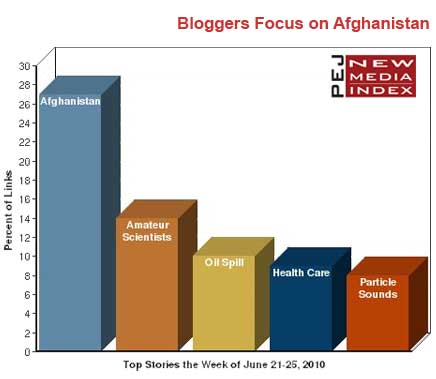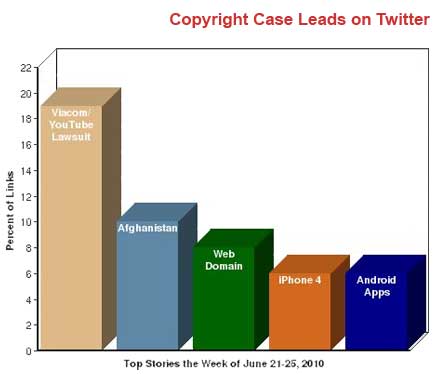
 The removal of General Stanley McChrystal as the top commander in Afghanistan led to a rare week when the war captured the attention of social media.
The removal of General Stanley McChrystal as the top commander in Afghanistan led to a rare week when the war captured the attention of social media.
For the week of June 21-25, 27% of the news links on blogs and 10% on Twitter were about Afghanistan according to the New Media Index from the Pew Research Center’s Project for Excellence in Journalism.
For blogs, this was the highest level of coverage the war had received since PEJ began the NMI in January 2009, and marks only the second time in 2010 that the subject was among the top five in a week.
On Twitter, the week was even more remarkable as, on the platform where attention often lasts only hours, the war became a top linked-to story for two weeks running.
Though it was McChrystal’s comments condemning the civilian leadership which sparked news, it was President Obama that came under the fire of most online commentators. Many debated whether Obama should remove McChrystal from office. Some blamed Obama directly for the tension between McChrystal and the Afghan leaders. And others used the episode as an opening to criticize the war mission itself.
Overall, the driving theme both on Twitter and in blogs was primarily a level of frustration with the war itself. Some felt Obama had done a poor job conducting an important war while others thought the entire endeavor was beyond salvaging and that the troops should be brought home immediately.
The episode also illustrates the speed at which social media often operate. Almost immediately after mainstream news outlets reported the controversial quotes in Rolling Stone magazine, and days before the issue hit newsstands, online commentators were weighing in.
The other most linked-to stories on Twitter last week turned back to technology and the Web. At the top, at 19% and ahead of Afghanistan, was a landmark court case involving online copyright laws that many felt could have far-reaching implications.
A Manhattan judge, on June 23, threw out a $1 billion lawsuit that Viacom had brought against YouTube and its parent company, Google. Viacom claimed that YouTube allowed copyrighted material on its site without permission. The judge, however, ruled YouTube was not liable since the site works cooperatively with copyright holders to remove illegal videos once notified.
The vast majority of Twitterers passed along news stories about the ruling without additional comment. Those who did add commentary primarily approved of the judge’s decision, claiming it to be a victory for freedom online.
 The third-largest linked-to topic on Twitter (at 8%) was news that the board which oversees naming of Internet domains officially approved a domain suffix devoted solely to pornography (at 8%).
The third-largest linked-to topic on Twitter (at 8%) was news that the board which oversees naming of Internet domains officially approved a domain suffix devoted solely to pornography (at 8%).
Two device-focused stories followed, both at 6%: an MSNBC.com story that aggregated various positive reviews of Apple’s new iPhone 4, and a warning that some applications for the Android smartphone allow third-party entities to access sensitive or private information.
For bloggers, the rest of the top stories on blogs were a mixture of science and current events.
The second most linked-to story, at 14%, was a BBC report about Mark Suppes, a New York web designer who is part of a growing number of amateur scientists trying to produce clean energy on their own through nuclear fusion.
A variety of stories about the ongoing oil spill in the Gulf ranked third at 10%, including a BBC report that a rig worker identified a leak in the rig’s safety equipment weeks before the explosion occurred.
A USA Today article about doctors refusing new Medicare patients due to low government payment rates was fourth at 9%. And news that scientists have simulated sounds made by sub-atomic particles when they are produced at the Large Hadron Collider near Geneva, Switzerland, was fifth at 8%.
Afghanistan
Even before comments made by General McChrystal surfaced on Tuesday, June 22, the online community had begun focusing their attention on the war in Afghanistan.
Some bloggers, for example, discussed a June 19 Washington Post report that the governments of Pakistan and Afghanistan had entered into negotiations with insurgents fighting U.S. forces about how to make peace. On Twitter, a number of users shared news from a June 21 BBC report that the death toll for British soldiers in Afghanistan had reached 300.
Then once McChrystal’s remarks became known and his future came into question, social media centered-in on that subject. Almost immediately after the initial reports became public, many bloggers weighed in on whether Obama should remove the General from his position.
"When a Runaway General trashes his Commander-in-Chief, or President Obama and his Administration, I think they call it insubordination," determined egalia at Tennessee Guerilla Women. "Bush would have fired the General’s ass yesterday."
"It is a case of poor judgment on the part of the general and his staff to air comments on the character of senior civilian leaders to a reporter, but both the White House and the brass need to put this media gaff aside and focus on the real problem – destroying al Qaeda, defeating the Taliban and helping establish an Afghanistan that can govern itself," argued An Ol’ Broad’s Ramblings.*
Others felt that the real and more long-term problem was Obama’s leadership.
"If anyone deserves blame for the latest airing of the administration’s internal feuds over Afghanistan, it is President Obama," wrote merriemarie. "For months Obama has tolerated deep divisions between his military and civilian aides over how to implement the counterinsurgency strategy he announced last December."
"No drama Obama and his crew have some ‘message’ problems now, but more importantly our troops on the ground have problems from a White House that does not fully support them or their mission," criticized jmuller at The Washington Syndicate.
And when Obama announced that McChrystal would be dismissed and replaced by General David Petraeus, the online reviews of Obama were mixed while widespread confidence came through for Petraeus.
"This move actually makes slightly more sense, blunting conservative criticism by tapping their Iraq hero for the job," wrote Perry Dorrell at Brains and Eggs.
"There was only one choice that could have vindicated presidential authority over the military while ensuring the continuity of operations in Afghanistan – and Obama made it," wrote former George W. Bush speechwriter Michael Gerson at The Roosevelt Room. "Gen. David Petraeus is the intellectual architect of modern counterinsurgency strategy…Most urgently, Petraeus knows how to show deference to civilian control of the military without abandoning his own military views."
"Safe facesaver kneejerk choice in Petraeus, anyway," determined Jules Crittenden. "[Obama’s] deeply considered overnight decision settled on a guy who, if now somewhat overstretched, has demonstrated he has a clue."
For some bloggers, the McChrystal episode was a chance to voice their opposition to the entire war itself.
"The ‘surge’ strategy has not actually worked, in either Iraq or Afghanistan," declared Gorilla’s Blog. "We’ve lost both wars, spent several trillion dollars and the people who attacked us remain at large. It’s a total failure for which no one wants to take any responsibility."
"BRING THE TROOPS HOME NOW FROM AFGHANISTAN AND IRAQ!" exclaimed White Noise Insanity. "There is no winning, so there’s no reason to still be there!"
YouTube vs. Viacom Court Ruling
The news of the June 23 decision by U.S. District Judge Louis Stanton to throw out Viacom’s lawsuit against YouTube and its parent company Google spread rapidly throughout the online community. On Twitter, it took just a few hours for many users to link to various accounts of the case from sites such as the BBC, CNET, and Wired.
The majority of Twitterers who spotlighted the story simply posted a short description of the case along with a link with messages such as, "#Google update Google defeats Viacom in landmark copyright case – CNET."
The few tweets that included some commentary called the ruling a victory for users of the Web and a loss for large corporate interests.
"One small step for Google, one giant leap for user generated content," cheered Graeme Newman.
"Take THAT, Viacom! You greedy, selfish, 100% purely evil company!" added Reuben Glaser. "YouTube – 1, Viacom – 0. Huzzah!"
That sentiment reverberated across the Web more broadly. As David Kravets of Wired wrote, "The ruling, if it survives, is a boon for internet freedom…Wednesday’s decision says internet companies, even if they know they are hosting infringing material, are immune from copyright liability if they promptly remove works at a rights-holder’s request – under what is known as a takedown notice."
YouTube
On YouTube last week, the audience split its attention between a Congressman’s poor behavior and a uniquely talented toddler.
The most viewed news video was the same as it had been the previous week – an embarrassing confrontation for


